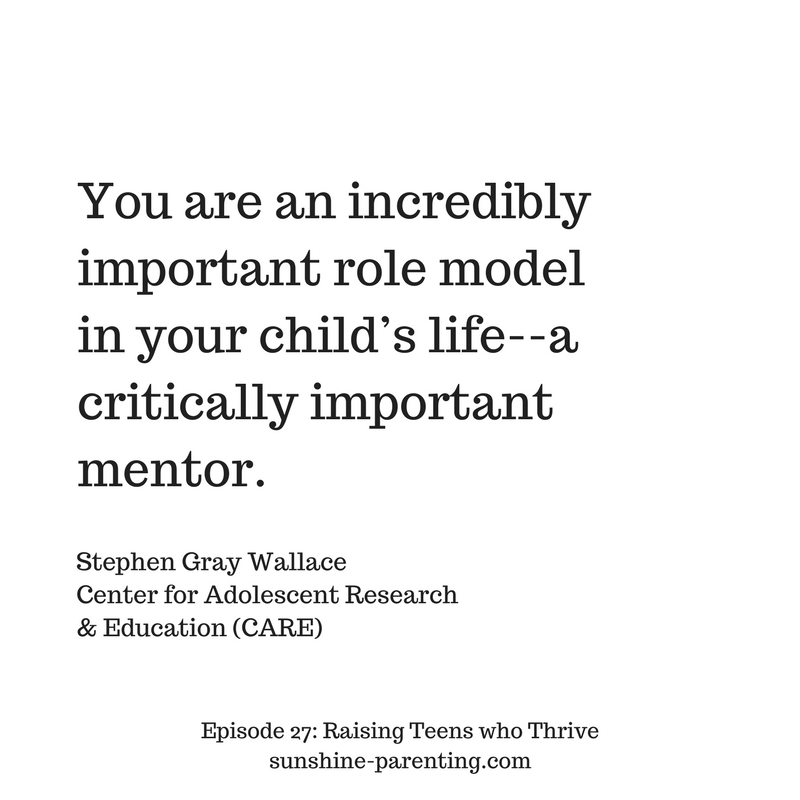Mar 9, 2018
 "We are highly focused on promoting
favorable youth outcomes, things like positive identity formation,
character development, leadership, civic engagement, social
entrepreneurship, media and financial literacy, conflict
resolution.... and we're focused on prevention, working on issues
like youth suicide, prescription drug use by young people, the
opioid epidemic, those types of things."
"We are highly focused on promoting
favorable youth outcomes, things like positive identity formation,
character development, leadership, civic engagement, social
entrepreneurship, media and financial literacy, conflict
resolution.... and we're focused on prevention, working on issues
like youth suicide, prescription drug use by young people, the
opioid epidemic, those types of things."
Stephen Wallace
Center for Adolescent Research and Education
(CARE)
About Stephen Gray Wallace
In Episode 27, I’m talking with Stephen Gray Wallace. Stephen has broad experience as a school psychologist and adolescent/family counselor. He is president and director of the Center for Adolescent Research and Education (CARE), a former associate research professor at Susquehanna University, and the past national chairman and chief executive officer at SADD (Students Against Destructive Decisions/Students Against Driving Drunk). Stephen also works with the American Camp Association (ACA) as a feature magazine writer, media spokesperson and faculty member at its e-Institute for Professional Development.
In addition, Stephen is a resident camp director and the director of counseling and counselor training at Cape Cod Sea Camps. Stephen was also appointed to the professional development faculty of the American Academy of Family Physicians (AAFP) and serves as a parenting expert for kidsinthehouse.com. He previously served as an adjunct professor at Mount Ida College in Newton, Massachusetts. Most important, Stephen is a high-profile participant in, and commentator on, the modern-day adolescent experience.
Reality Gap
Stephen is the a
.
Reality Gap is a book that talks about what teens are doing in real life compared to what parents think they’re doing. The chart in his book (see image on right), helps parents think about preparing kids to take responsibility for themselves. As your child matures, you should see decision making moving from left to right. When kids are young, parents decide, then as they get older, you make joint decisions on some issues. Finally, by the time they are in late high school, entering college, they need to learn to make good choices and decisions for themselves.
Authoritative parenting is the most effective with all ages of children, including teens. Authoritative parenting is high on expectations and high on warmth.
In our interview, conducted live at the American Camp Association Conference in Orlando in February, we talk about providing teens with both the structure and freedom they need to thrive.
Key Issues we Discuss
• Importance of staying involved (but not overbearing) in your teens’ lives--slowly giving them more responsibilities/freedom/choices.
• Issues teens face in the first semester of college and how to help with that transition. Directly communicating with teens about values rather than making assumptions about their ability to make good decisions.
• Camp is great for teenagers--teens like the structure and warmth (the perfect authoritative combo).
Quotes from Stephen Gray Wallace
“You want to give your kids some space as they’re getting older. Give them more responsibility, let them make some more decisions, pick your battles. Helicopter parenting is different than remaining an involved parent. They’re two completely different constructs. If you’re a helicopter parent, your kid is going to get to the next step in life and be dysfunctional. They need to learn to make those decisions themselves. But they need you as a partner.”
"Parents often sort of walk away when their children become teenagers. Think that they don’t really count anymore, that their kids don’t care what they same. But that’s how teens are… they start moving toward an internal locus of control. Parents get message that kids don’t want to hear from me but the exact opposite of that is true."
“You want to give your kids some space as they’re getting older. Give them more responsibility, let them make some more decisions, pick your battles. Helicopter parenting is different than remaining an involved parent. They’re two completely different constructs. If you’re a helicopter parent, your kid is going to get to the next step in life and be dysfunctional. They need to learn to make those decisions themselves. But they need you as a partner.”
Links & Resources
Thick and Thin: Summer Camps are Essential Organizations for Moral Growth, Psychology Today (mentioned in the intro)
Center for Adolescent Research and Education (CARE)
Reality Gap: Alcohol,
Drugs, and Sex--What Parents Don't Know and Teens Aren't
Telling (Book by Stephen Gray
Wallace talked about in the podcast)
